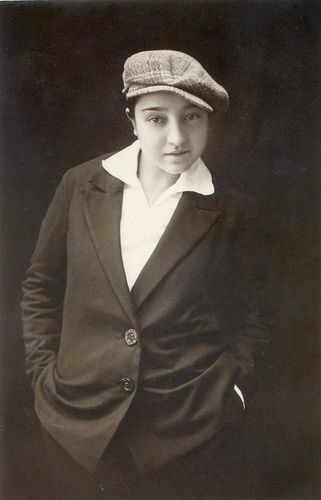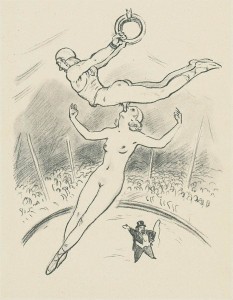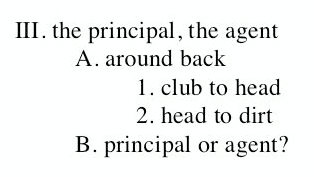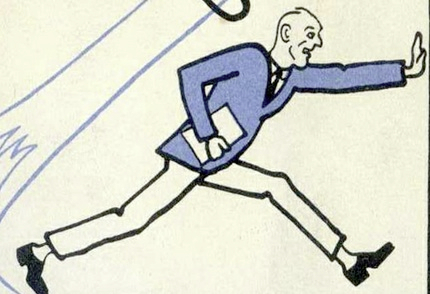Far down the list of women you have known is a girl named Pia. She was strange, beautiful, artistic. She was the one who on a whim painted all the leaves of a lovely red Maple green. The fight that ended your relationship started with that tree. At the time, you imagined yourself thoughtful. She was only ‘artistic’. Both of you had a little to drink and were careless with words. You told her it didn’t matter what she had done to the tree. The leaves were still red. She said the color depended. “On what?†I said. “If you love me, the leaves are green. If you don’t, they are red,†she said with tears starting in her eyes. I blew up. I don’t remember what I said after that. Some kind of horrible lecture about propositional logic? I might have even used the words “mutually exclusive� What I do remember was at the end of the night, after we had yelled, cried, and eventually broken up, her telling me that language is flexible like an artist, not uptight like a philosopher. Twenty years later in the doldrums of a long marriage with a degree or two in uptightness behind me, she might be right. Pia!
Collection of Oddities: Sweet Talk the Hot Box 10: Let Me Stand Next to Your Fire
The Life of the Mind 10: The Simulation Argument
Many works of science fiction as well as some forecasts by serious technologists and futurologists predict that enormous amounts of computing power will be available in the future. Let us suppose for a moment that these predictions are correct. One thing that later generations might do with their super-powerful computers is run detailed simulations of their forebears or of people like their forebears. Because their computers would be so powerful, they could run a great many such simulations. Suppose that these simulated people are conscious (as they would be if the simulations were sufficiently fine-grained and if a certain quite widely accepted position in the philosophy of mind is correct). Then it could be the case that the vast majority of minds like ours do not belong to the original race but rather to people simulated by the advanced descendants of an original race. It is then possible to argue that, if this were the case, we would be rational to think that we are likely among the simulated minds rather than among the original biological ones. Therefore, if we don’t think that we are currently living in a computer simulation, we are not entitled to believe that we will have descendants who will run lots of such simulations of their forebears.
Check out other work in the Life Of The Mind series here.
Uncollected 52, Leaves on Snow
The Social Unit 10: The State of Nature
The state of nature hypothesis, even when not explicit, haunts many theories of social organization. Man has always lived in social units whether family or clan. An analysis of ideal smaller social units and how we broaden them while keeping their virtues seems much more plausible and profitable.
Check out all the work in the collection: The Social Unit
The Snevets Stories 4: After Thoughts
I found myself wondering, what would Snevets say? And this, seventeen years after my last encounter with the old man. I was at a dinner party. The conversation was only half interesting. Maybe that is why Snevets came to mind. He could always turn a half interesting question into something you would miss work to think about. I have to say as much as he vexed me, I missed him.
It shouldn’t be surprising, but most of the criminals we investigate are painfully boring. They wouldn’t even make it as TV level villains. I watch cop movies feeling jealous, knowing that the protagonist, for the two hours the film lasts, lives inside the one interesting case of his career. Win or lose, that means something. I watch, the investigator is scared, frustrated, dogged, but I want to whisper, “You’ve found your Snevets. Enjoy, just a little.” ‘Just a little’ because it is not really a joy at all to investigate your Snevets.
I wonder if Snevets remembers me? Is it the same for criminals? Did Snevets yawn through hordes of incompetent detectives looking for me. I am sad now and it is this thought. If Snevets is alive, I am too old to chase him.
Check out other posts from The Snevets Stories here.
The Story of Discourse 9: Maxwell’s Demon
The hottest club in the metropolitan area is called Entropy Lost. The club is downtown and is rather unusual in its setup. Instead of people waiting out on the street to get in, Entropy Lost actually has a waiting area. Even stranger is that the waiting area is as big as the club itself. The two huge rooms are adjacent with only a door between them. The door is guarded by a man named Maxwell’s Demon. Some say the success of the club is attributable to this bouncer. The demon’s discernment is what makes the club. He has a great eye for hot, high energy people. These are the ones that he lets into Entropy Lost. Furthermore, the demon will periodically shut the door, go into the club, find plain, low energy people to toss from the club. They aren’t doing anything wrong, but the demon claims they are dragging the club’s vibe down. This of course is controversial. People definitely aren’t happy when they get tossed. They keep coming back though, because one hour in Entropy Lost is worth a whole night in the next best club in the city.
Collection of Oddities: Sweet Talk the Hot Box 9: Flower
The Life of the Mind 9: The Sad Case of Ronald Opus
On March 23, 1994, a medical examiner viewed the body of Ronald Opus and concluded that he died from a gunshot wound of the head caused by a shotgun. Investigation to that point had revealed that the decedent had jumped from the top of a ten-story building with the intent to commit suicide. (He left a note indicating his despondency.) As he passed the 9th floor on the way down, his life was interrupted by a shotgun blast through a window, killing him instantly. Neither the shooter nor the decedent was aware that a safety net had been erected at the 8th floor level to protect some window washers, and that the decedent would most likely not have been able to complete his intent to commit suicide because of this.
Ordinarily, a person who starts into motion the events with a suicide intent ultimately commits suicide even though the mechanism might be not what he intended. That he was shot on the way to certain death nine stories below probably would not change his mode of death from suicide to homicide, but the fact that his suicide intent would not have been achieved under any circumstance caused the medical examiner to feel that he had homicide on his hands.
Further investigation led to the discovery that the room on the 9th floor from whence the shotgun blast emanated was occupied by an elderly man and his wife. He was threatening her with the shotgun because of an inter-spousal spat and became so upset that he could not hold the shotgun straight. Therefore, when he pulled the trigger, he completely missed his wife, and the pellets went through the window, striking the decedent.
When one intends to kill subject A but kills subject B in the attempt, one is guilty of the murder of subject B. The old man was confronted with this conclusion, but both he and his wife were adamant in stating that neither knew that the shotgun was loaded. It was the longtime habit of the old man to threaten his wife with an unloaded shotgun. He had no intent to murder her; therefore, the killing of the decedent appeared then to be accident. That is, the gun had been accidentally loaded.
But further investigation turned up a witness that their son was seen loading the shotgun approximately six weeks prior to the fatal accident. That investigation showed that the mother (the old lady) had cut off her son’s financial support, and her son, knowing the propensity of his father to use the shotgun threateningly, loaded the gun with the expectation that the father would shoot his mother. The case now becomes one of murder on the part of the son for the death of Ronald Opus.
Now comes the exquisite twist. Further investigation revealed that the son, Ronald Opus himself, had become increasingly despondent over the failure of his attempt to get his mother murdered. This led him to jump off the ten-story building on March 23, only to be killed by a shotgun blast through a 9th story window.
The medical examiner closed the case as a suicide.
Check out other work in the Life Of The Mind series here.
Uncollected 51, I Don’t Understand
The Social Unit 9: Just State
Solely focusing on finding a workable theory of a just state is a misplaced effort. Justice is one of many virtues that an ideal state balances. Take the virtue of security. It wouldn’t do to be a just state that couldn’t defend itself from foreign aggression. Just as it wouldn’t do to be a secure state that was radically unjust.
Check out all the work in the collection: The Social Unit
Micro Song 24: Extramarital Sex
The Story of Discourse 8: The Bridges of Königsberg
The bridges in the city of Königsberg have a magical property. When you wander through the moonlit evenings of summer and stop to ask yourself a question, these bridges have the power of launching you and that question on a journey. You have no idea where the asking of the question will take you only that the answer will be much larger than the question itself. There is a strange nuance to the bridges’ power. The sillier, the more innocent, the more idle the question the stronger the bridges’ powers are. Don’t make the mistake of asking something like “Does God exist?†A question of that magnitude renders the bridges’ power totally impotent. Instead, think along the lines of, “Why are portholes round?†or “How many people would it take to blow a cloud through the sky?†You will get much better results from questions of this nature.
Collection of Oddities: Sweet Talk the Hot Box 8: Loverboy
The Life of the Mind 8: Pia’s Green Leaves
Consider Pia who owns a Japanese Maple tree, with russet leaves. Thinking that the leaves should be green. Pia paints them, and having finished, she says “The leaves on my maple tree are green.” apparently truly. Shortly afterwards, Pia receives a phone call from a friend, a botanist looking for green leaves for a study of green-leaf chemistry. Pia offers him the leaves from her Japanese Maple tree. This time, when she utters “The leaves on my maple tree are green.” she says something false. The same tree is referred to both times, and the tree’s leaves have not changed color between the first utterance and the second. Is what ‘counts as’ being green different in the two contexts?
Check out other work in the Life Of The Mind series here.
Uncollected 50, Whoops I Did My Mom
The Social Unit 8: The Veil of Ignorance
In the original position behind a veil of ignorance, one is asked to imagine what kind of distribution schemes one would agree to not knowing one’s place in society ahead of time. I imagine pie charts of various sizes sliced in different ways floating by me. Maybe we can even add Nozick’s games and their rules into the mix. If we are not overwhelmed, we choose and are suddenly given a slice of pie or a starting position in a game. If I ever complain, I am reminded, ‘but this is what you chose’ and this is supposed to satisfy me. But does it really? Think how many things you have chosen that you later regret, or at least wonder about alternatives. Initially choosing a distributive scheme is not sufficient for an ideal society, we must keep choosing it. The preference has to be stable. Rawl’s original position thought problem tells us a lot about what societies we would enter into, not as much about societies we would continue to live in.
Check out all the work in the collection: The Social Unit
Rub in Line Out 34: Space Is Limited
red collar of dialog
space is a man speaks
as if all are too worried
gun or lack
meal or recog-nicigan
heraldry of metals
cut and rake
The Story of Discourse 7: Zeno’s Turtle
If you ever meet Zeno’s turtle on the road, know that he is prone to half measures. For if the two of you are on the way to town, he will only go half as far as he needs to and stop regardless of how much daylight is left. He is rather rule-bound about it. Don’t try to prod him or convince him of the futility of always only going halfway. Worse still, don’t try to pick him up. No matter how much you have enjoyed his company, and he is pleasant for a turtle, if you try to carry him the remaining distance, he will bite. And if you whine to him that he’ll never actually get to town, he stoically replies, maybe so but I can always be as near as you need me to be.
Collection of Oddities: Sweet Talk the Hot Box 7: Hesitating Beauty
The Life of the Mind 7: The Veil of Ignorance
If you were to decide the rules of a social order without knowledge of your own talents, race, gender…any of your natural attributes, and you also didn’t know what position you would be put into in a society, which rules would you decide on for the society?
Check out other work in the Life Of The Mind series here.
Uncollected 49, Hips
The Social Unit 7: Procedure for Dissolution
It is important for social units of the future to include in their constitutions (written or implicit) a procedure for dissolution or succession. This procedure would aid poorly functioning units from lapsing into civil wars, and encourage emerging unions by lowering the risks of conglomeration.
Check out all the work in the collection: The Social Unit
The Mantra of Craft T-shirt Gallery 13
The Story of Discourse 6: The Ring of Gyges
The Ring of Gyges is one of those great underdog stories. The thing looks like it could come out of a crackerjack box. As an ornament it is a failure. It is so ugly in fact that humility forces it to become invisible when anyone wears it. Furthermore, the humility is contagious. It makes the bearer invisible as well. This effacement becomes the source of the ring’s power. Anyone that wears the ring, can go anywhere undetected. Imagine the possibilities. The violent can kill and maim; the venal, steal; the lusty, peep; and do-gooders can dispense with silly masks and capes. Of course, what many people wonder is does the ring further or change one’s ends?
Collection of Oddities: Sweet Talk the Hot Box 6: I’m on Fire
The Life of the Mind 6: Triple Threat
Suppose we agree that everyone has a right to life, but that a person forfeits this right when he threatens the life of another–in that case it’s permissible to kill him.
Now consider three people, A, B, and C. A aims a gun at B, B aims a gun at C, and C aims a gun at A. When A takes aim, he’s threatening another person, so he loses his own right to life. Normally in that case C would be justified in killing him, since this defends B. But B is aiming at C, which means he forfeits his own right to life, which means that A can kill him, and that C can’t kill A.
Check out other work in the Life Of The Mind series here.
Uncollected 48, Grate
The Social Unit 6: Marketing
I am a bit worried that I have been thinking about marketing all wrong. It seems as though marketing might be part of the actual product/service’s value. For an example, consider the placebo effect in relation to pharmaceuticals. What is amazing than the fact that presentation matters almost as much as content. Moreover, they reinforce each other. The greater the efficacy of a drug, the greater the placebo effect.
Check out all the work in the collection: The Social Unit
The Story of Discourse 5: Kant’s Madman
Kant’s Madman knocks on doors. He never visits the person he is looking for, but only the friends of that person. He is not very direct in this way. When you open the door, the madman must present himself as homicidal in manner and tone. He also, and this is the hardest part, must conceal an ax so that it is visible to you on the one hand, but makes you believe he is trying to hide it on the other. This takes a lot of practice. His lines are easy. There is only one question to utter. He asks where your friend is. Scary, right? But not really if you have heard about him before. Because even if you give up your friend’s location, the madman won’t go find him. He simply walks from your front step to another house, knocking on a different door, asking the same question to another friend of your friend.
Caveat to Aspiring Immortals 16
Collection of Oddities: Sweet Talk the Hot Box 5: Let’s Do It (Let’s Fall in Love)
The Life of the Mind 5: Traps and Intuitions Descriptor
Traps and Intuitions is a category belonging to The Life of the Mind that contains what are often referred to as thought problems. They create a story or choice in which the reader experiences conflict between ideas, or one that reveals the reader’s deeper intuitions. Intuitions that one might not be ready to acknowledge when asked directly.
Check out other work in the Life Of The Mind series here.
Uncollected 47, Food Chain
The Social Unit 5: Giving
The hot thing in charity seems to be simple non-means-tested transfers, like GiveDirectly. The logic is that the people receiving the money know what will best improve their lives. The logic and the empirical results of such transfers are compelling. At the same time, I find it difficult to reconcile with what I hear about lottery winners. I’m not sure if anyone has studied it, but one hears plenty of anecdotes on how the lottery has ruined a winner’s life. One way to reconcile these two ideas is that low-level cash transfers tend to benefit people while excessive cash transfers ruin them. If this ends up being correct, is there some kind of sweet spot (percent of yearly income) where an unencumbered infusion of cash is likely to benefit one maximally?
Check out all the work in the collection: The Social Unit
Dirty Dish Gallery 16: Splat
The Story of Discourse 4: Gavagai
Unlike other creatures that are born and then named, Gavagai was born name first. While we wait patiently to be named, then nicknamed, and possibly renamed. Gavagai is a name and is waiting for its thingness to come. Preliminary analyses suggest that Gavagai has been thing-ed with something related to a rabbit. It could be the rabbit itself, part of the rabbit. It could be some aspect, perhaps the color, or an action the rabbit is performing. Some have conjectured that it’s simply an idea suggested by the bunny. Only time will tell. As our names and nicknames are proposed and retired, leaving our one singular name, we too will have to wait and see what substance remains around Gavagai. I am patient. We will make progress on the matter. I do doubt sometimes that we will ever be quite sure what thing-ed Gavagai though.
Collection of Oddities: Sweet Talk the Hot Box 4: I Just Want to Make Love to You
The Life of the Mind 4: The Chinese Room
The Chinese Room argument begins with this hypothetical premise: suppose that artificial intelligence research has succeeded in constructing a computer that behaves as if it understands Chinese. It takes Chinese characters as input and, by following the instructions of a computer program, produces other Chinese characters, which it presents as output. Suppose, says Searle, that this computer performs its task so convincingly that it comfortably passes the Turing test: it convinces a human Chinese speaker that the program is itself a live Chinese speaker. To all of the questions that the person asks, it makes appropriate responses, such that any Chinese speaker would be convinced that he or she is talking to another Chinese-speaking human being.
The question is this: does the machine literally “understand” Chinese? Or is it merely simulating the ability to understand Chinese?
If you think the computer understands Chinese, then suppose that a man is in a closed room and has a book with an English version of the computer program, along with sufficient paper, pencils, erasers, and filing cabinets. He could receive Chinese characters through a slot in the door, process them according to the program’s instructions, and produce Chinese characters as output. If the computer had passed the Turing test this way, it follows, that he would do so as well, simply by running the program manually.
There is no essential difference between the roles of the computer and the man in the experiment. Each simply follows a program, step-by-step, producing a behavior which is then interpreted as demonstrating intelligent conversation. However, the man would not be able to understand the conversation he is mediating. Therefore, neither does the computer in the original example.
Check out other work in the Life Of The Mind series here.
Uncollected 46, Lost My Head
The Social Unit 4: Coercion
One point I take from Nozick’s critique of Rawls is that any distributive scheme that stipulates an ideal end state requires coercion. Given natural micro-level exchanges, any kind of distributive goal will require redistribution of goods, not just initially but in an on-going manner. It is important to recognize this, but it also works against Nozick too. There is no perfect libertarian coercion-free social unit. The market through its own actions will collapse into monopolies without coercion. We are stuck with coercion of some kind to make liberty (and our markets) work at all. The question is not how do we get rid of coercion, but how do we make coercion less onerous. There are many varieties of coercion, spanning from the threat of gulags to eye rolling to gentle nudges.
Check out all the work in the collection: The Social Unit
Series X, 33 Booty Ball Bump
The Story of Discourse 3: Descriptor
Sometimes the examples, details, and monikers of philosophy have a narrative power independent of their power to clarify. The Story of Discourse makes use of these story-charged bits to embellish and create.
Collection of Oddities: Sweet Talk the Hot Box 3: A Little Sugar in My Bowl
The Life of the Mind 3: Newcomb’s Paradox
A person is playing a game operated by the Predictor, an entity somehow presented as being exceptionally skilled at predicting people’s actions. Predictor’s predictions are “almost certainly” correct.
The player of the game is presented with two boxes, one transparent (labeled A) and the other opaque (labeled B). The player is permitted to take the contents of both boxes, or just the opaque box B. Box A contains a visible $1,000. The contents of box B, however, are determined as follows: At some point before the start of the game, the Predictor makes a prediction as to whether the player of the game will take just box B, or both boxes. If the Predictor predicts that both boxes will be taken, then box B will contain nothing. If the Predictor predicts that only box B will be taken, then box B will contain $1,000,000.
By the time the game begins, and the player is called upon to choose which boxes to take, the prediction has already been made, and the contents of box B have already been determined. That is, box B contains either $0 or $1,000,000 before the game begins, and once the game begins even the Predictor is powerless to change the contents of the boxes. Before the game begins, the player is aware of all the rules of the game, including the two possible contents of box B, the fact that its contents are based on the Predictor’s prediction, and knowledge of the Predictor’s infallibility. The only information withheld from the player is what prediction the Predictor made, and thus what the contents of box B are. Question: do you take two boxes or one box?
Check out other work in the Life Of The Mind series here.
Uncollected 45, Levitate
The Social Unit 3: Choice
Choice is a more complicated thing than is often thought. One hears that market transactions are voluntary and therefore reflect each actor’s preference or choice. What is clear to me is that we have many preferences that often conflict. Example, one chooses to maintain one’s health and eat the cookie on the counter. I think of these preferences loosely as shorter term and longer term. The markets I am used to are very responsive of shorter term preferences. One question is how might one structure current markets to better balance the totality (often conflicting) of one’s preferences? And if not, what other methods of distribution would perform better in this respect than markets.
Check out all the work in the collection: The Social Unit
Light 23: radial
Check out other work in the Light series here.
The Story of Discourse 2: Descartes’ Demon
Descartes’ Demon is a maker of dreams and illusions. He has made your world, keeping you from his world. He must at times be sad that he cannot join his beautiful, sad, dramatic creation; or at least wonder why he has no monster to relieve him of the monotony of pure being. You have different problems though. You are stuck with his illusion, but you can choose to live it as life or as a lie. Do not anguish too much over your choice. Skepticism being what it is there might not be much difference.
Collection of Oddities: Sweet Talk the Hot Box 2: To the Virgins, to Make Much of Time
Gather ye rose-buds while ye may,
Old Time is still a-flying;
And this same flower that smiles today
Tomorrow will be dying.
The glorious lamp of heaven, the sun,
The higher he’s a-getting,
The sooner will his race be run,
And nearer he’s to setting.
That age is best which is the first,
When youth and blood are warmer;
But being spent, the worse, and worst
Times still succeed the former.
Then be not coy, but use your time,
And while ye may, go marry;
For having lost but once your prime,
You may forever tarry.
The Life of the Mind 2: Inequality
You have two groups of people. The people in group A have $1,000 each and the people in group B have $1,000,000 each. The only options available to you are to take away money from people in group B, so they each have $1,000, or to do nothing. Which would be the better course of action?
Check out other work in the Life Of The Mind series here.
Uncollected 44, Idea
The Social Unit 2: Boundaries
Many of a social unit’s most difficult moral questions occur at physical and temporal boundaries. Those members coming to be, those members that will be, those that live among us, but aren’t full members. Who should we induct as members, how many, who should we exile, what protections do we offer them? And what do we owe the members of other social units that we so drastically affect?
Check out all the work in the collection: The Social Unit
Collection of Oddities: The Hair-lo 14
The Story of Discourse 1: Wittgenstein’s Ladder
Wittgenstein’s ladder is a one-way ladder. Climbing it is difficult but descent is impossible. Once you have reached the top, there is a popular misconception that the ladder blocks your regress by casting itself down on the ground. However, ladder cognoscenti know that the ladder is much too subtle and elegant for that. The way it works is you can mount the ladder to return to the ground, but as you start to lower yourself, the ladder moves up at the same rate. The cumulative effect is null. The ladder has borne you up, and will now bear you exactly where you are for eternity.
Collection of Oddities: Sweet Talk the Hot Box 1: Beast of Burden
The Life of the Mind 1: The Ship of Theseus
“The ship wherein Theseus and the youth of Athens returned from Crete had thirty oars, and was preserved by the Athenians down even to the time of Demetrius Phalereus, for they took away the old planks as they decayed, putting in new and stronger timber in their place, in so much that this ship became a standing example among the philosophers, for the logical question of things that grow; one side holding that the ship remained the same, and the other contending that it was not the same.”
Plutarch, Theseus
Check out other work in the Life Of The Mind series here.
Uncollected 43, Woman in Cap
The Social Unit 1: Definition
Definition: There is this thing that we all do together. I would like to talk about that, all collective activities: families, clubs, organizations, firms, nation states…
Check out all the work in the collection: The Social Unit
Re: 12, Windmill Hair
Reminds me of…Series X, 16 Windmill

Uncollected 42, Airstrip
Series X, 32 Wings
Dirty Dish Gallery 15: Pube Snuggle
Rub in Line Out 33: Target Small
Micro Song 23: Doing the Crocodile
Uncollected 41, Donkey
Series X, 31 Broom
Demonstrations 11: Wright and Nott
That Wright is Wright and Nott is Nott
Logicians must concede.
That Nott is right and Wright is not
Four judges have decreed.
That Nott is right, and Wright is not,
We all must now agree;
Then Nott is right and Wright is Nott,
The same thing, to a t.
If Nott is Nott and Wright is Nott,
It comes without a wrench
That we have not, if not two Notts,
Five judges on the bench.
If only four, as shown before,
And three agree with Nott,
The judgment is unanimous,
And Wright’s dissent is naught.
The knot is not, is Nott not Nott?
But is Wright right, or Nott?
Is Nott not right? What right has Wright
To write that Nott is not?
He concluded, “Do I do right to write to Wright
This most unrighteous rot?”
(I found this somewhere. I can’t remember where.)
Rub in Line Out 32: Gorge Lips
Micro Song 22: Live Fast
Uncollected 40, Face
Series X, 30 Trapeze
Re: 11, Tangle
Reminds me of…Series X, 27 Cube
Rub in Line Out 31: Principal/Agent
Micro Song 21: Flip Flop
Uncollected 39, Fall Slow
Series X, 29 Man on the Moon
Dirty Dish Gallery 14: Leaf
Rub in Line Out 30: Action
Micro Song 20: All
Uncollected 38, Fur
Series X, 28 Mask
Caveat to Aspiring Immortals 15
Rub in Line Out 29: Mouth Nose Crop
Micro Song 19: Boule
Uncollected 37, Hand on Wall
Series X, 27 Cube
Light 22: hand
Check out other work in the Light series here.
Rub in Line Out 28: Small Man
Micro Song 18: Behind
Uncollected 36, Hand-face
Series X, 26 Crystal
Dirty Dish Gallery 13: Spiral
Rub in Line Out 27: How to Amuse
Micro Song 17: Baby Carrots
Uncollected 35, Opening
Series X, 25 Muddy Hands
Light 21: file cabinent
Check out other work in the Light series here.









































